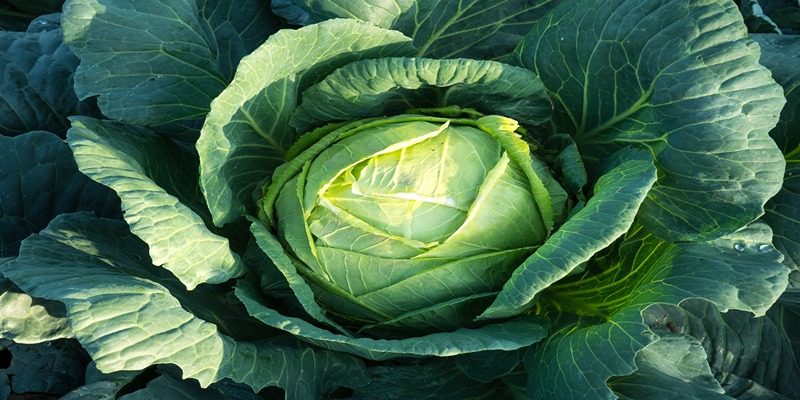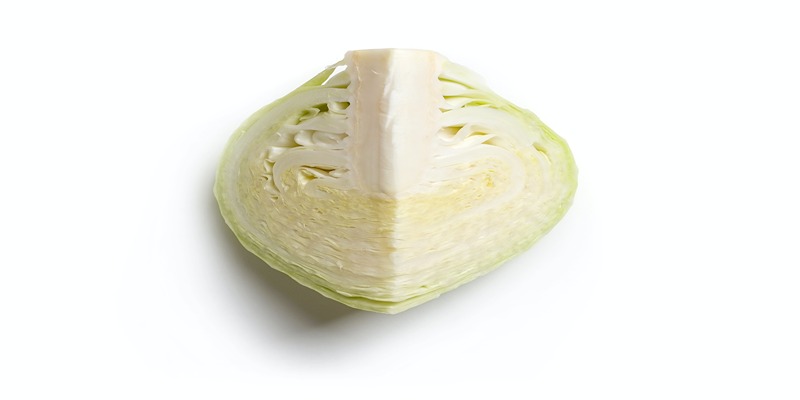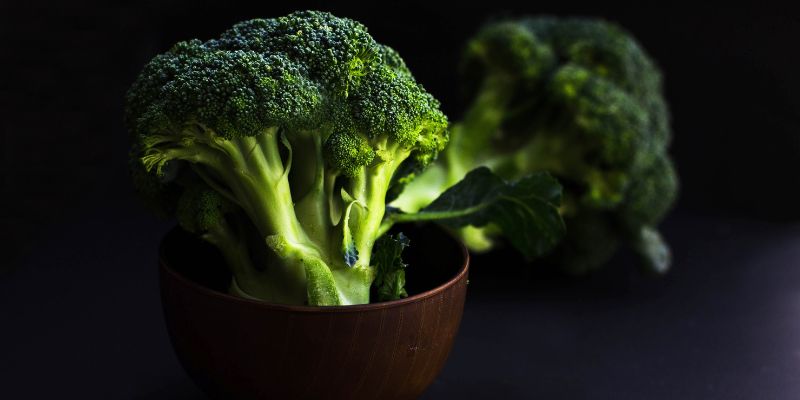Cabbage is highly esteemed for its adaptability in the kitchen and so plays an important role in many diets throughout the world. This verdant vegetable, which may be any shade from green to purple, is rich in nutritious value and gives food a satisfying crunch. Cabbage makes a substantial contribution to the daily nutritional needs due to its abundance of vitamins K, C, and B6. It helps with digestion because of its high fiber content, and it fights oxidative stress with its antioxidants. Because of its low-calorie content, cabbage is a popular item among dieters. Plus, it's a great way to get the minerals your body needs, including potassium and manganese. Because of these qualities, cabbage is an important part of many different cuisines across the globe.

Cabbage Nutrition: A Comprehensive Analysis
As a cruciferous vegetable, cabbage is rich in many essential elements and is an important part of a healthy diet. This nutritious leafy green is a must-have for any balanced diet due to its low-calorie count, high fiber content, and plenty of vitamins and minerals.
Detailed Breakdown of Vitamins, Minerals, and Fiber in Cabbage
Vitamin K is important for healthy blood coagulation and bones, and cabbage has a high quantity of this nutrient. It just takes one cup to provide 85 percent of the daily requirement. Cabbage is a great source of vitamin C, an antioxidant that helps maintain healthy skin and immune systems, and it also contains a ton of it (approximately 54% of the recommended daily dose). Vitamin B6 and folate, which are essential for proper metabolism and brain function, are also present in excellent amounts in this food.
Cabbage contains minerals that are essential for maintaining healthy bones, blood pressure, and cardiovascular function, such as magnesium, potassium, and calcium. Even though it doesn't have as much iron as meat, it helps the blood carry oxygen.
Cabbage has an impressive amount of fiber. A diet high in dietary fiber has several health benefits, including a reduced risk of chronic illnesses, improved digestive health, and support for weight maintenance.
Comparison with Other Leafy Greens
The nutritional content of cabbage is comparable to that of other leafy greens, such as kale and spinach. Although kale has more vitamin K and C than cabbage, the latter is close behind and is generally chosen for its softer taste and adaptability in the kitchen. Cabbage has more vitamin C and fiber than spinach, which is better known for its iron and calcium.
Compared to other greens, cabbage has a special group of antioxidants called sulforaphane and kaempferol. There is evidence that certain chemicals help decrease inflammation and the likelihood of developing some malignancies.
Health Benefits of Cabbage: From Gut to Brain
The cruciferous vegetable cabbage has many positive effects on health, from the digestive system to the brain. It is a great addition to a balanced diet because of the nutrients it contains.
Impact on Digestive Health
The high fiber content of cabbage is well-known and essential for maintaining healthy digestive systems. Preventing constipation is one of the many benefits of a high-fiber diet. Additionally, it supports a healthy digestive system by feeding the bacteria in the stomach. Carrots include glycosinolates, which may prevent gastrointestinal problems by protecting the lining of the digestive tract.
Roles in Cardiovascular and Brain Health
Cabbage is a nutritional goldmine for heart health. It lowers blood pressure and stops platelet accumulation, two risk factors for cardiovascular disease, thanks to its high polyphenol content. Cabbage is rich in potassium, which is essential for maintaining a healthy blood pressure level.
Red cabbage's anthocyanins and vitamin K content make it a brain food that helps with focus and cognition. Synthesis of sphingolipids, a family of lipids essential to brain cell architecture, requires vitamin K. Cognitive impairment is associated with oxidative stress and inflammation; the antioxidants in cabbage help alleviate these problems.

Cancer-Fighting Properties
Sulforaphane and indole-3-carbinol are two of the powerful anticancer chemicals found in cabbage. There is some evidence that these chemicals may slow the proliferation of cancer cells. They have the potential to have chemopreventive effects by changing the expression of genes that are implicated in the development of cancer, particularly colorectal tumors. Cabbage and other cruciferous vegetable intake is linked to a decreased risk of many cancers.
Incorporating Cabbage into a Nutritious Diet
Cabbage is a great complement to many dishes because of its high nutritional profile. Because of its adaptability and delicious flavor, it opens up a world of options for adding nutritious value and flavor to food.
Creative and Tasty Ways to Add Cabbage to Meals
Cabbage is a versatile vegetable that may be prepared in a variety of tasty ways. Use it in salads for a traditional twist; the crunchiness will provide a burst of freshness. Many choose coleslaw, which is shredded cabbage mixed with a mild dressing. Warm cabbage sautéed with garlic and onions is a tasty side dish that's easy to make.
One such creative use for cabbage is in cabbage rolls. An appetizing and filling way to prepare cabbage leaves for baking is to stuff them with a combination of rice, meat, or veggies. Sauerkraut and kimchi, both made by fermenting cabbage, are good for gut health because they include probiotics.
Cabbage is a low-calorie way to boost the bulk and nutrition of soups and stews. It absorbs tastes exquisitely and goes well with a variety of meats and veggies. The crisp contrast that cabbage adds to stir-fries is just what the dish needs.
Balancing Cabbage Intake with Other Nutritious Foods
Cabbage is healthy, but diversity is key to a well-rounded diet. For a well-rounded diet, it's best to eat cabbage with a variety of other foods. Cabbage is a great complement to lean foods like fish, poultry, or beans, so you can make a well-rounded dinner. Incorporating a diverse array of fruits and vegetables into one's diet guarantees an adequate supply of antioxidants, vitamins, and minerals.
Cabbage meals are enhanced with the addition of fiber and other vital elements found in whole grains, such as quinoa or brown rice. Dietary healthy fats, such those in nuts, avocados, and olive oil, provide essential fatty acids and improve nutrient absorption.
Nutritious Cabbage Diet: Meal Planning and Recipes
Sample Meal Plans Featuring Cabbage
You can see how this healthy vegetable might fit into your weekly diet by looking at some sample meal plans that include cabbage. Take Monday as an example. For lunch, you might have a tart vinaigrette dressing with cucumber, cherry tomatoes, and cabbage. For dinner, you could have a robust stir-fry with cabbage, tofu, and bell peppers. On Wednesday, you may have grilled cabbage steaks with a sprinkle of parmesan for lunch and a hearty chicken and cabbage soup for the evening. For a nutritious and tasty lunch on Friday, try cabbage wraps stuffed with grilled veggies and hummus. To close out the week, have a hearty cabbage and beef stew for the evening.
Easy and Healthy Cabbage Recipes
The flexibility of cabbage is further enhanced by easy and healthful cabbage dishes. Chopped cabbage, vegetable stock, tomatoes, and a variety of herbs are added to sautéed onions, garlic, carrots, and celery in a basic cabbage soup recipe. The mixture is cooked until the veggies are soft. Another delicious alternative is stuffing cabbage leaves with a savory combination of cooked rice, ground turkey, spices, and boiling cabbage leaves. This filling is then baked in a rich tomato-based sauce. The ideal side dish for those looking for something lighter is a cabbage slaw, which combines shredded cabbage, carrots, apple slices, and a light yogurt dressing. All things considered, these menus and recipes show how simple and tasty it is to include cabbage in one's diet, which is great for maintaining a balanced and nutritious diet.
Conclusion
Cabbage is a must-have vegetable since it adds flavor and nutrients to every meal. Salads, soups, and stir-fries are just a few of the many tasty ways that cabbage may be used in the given meal plans and recipes. The nutritional content and taste of food are both improved by each recipe. Consuming cabbage on a regular basis may greatly enhance dietary balance and health, highlighting its multifaceted function as a culinary and nutritional powerhouse.




